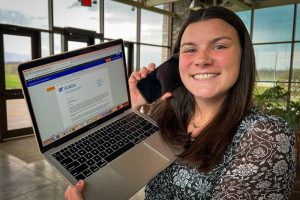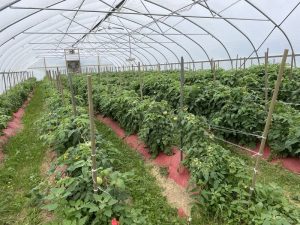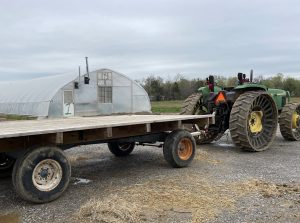 We are pleased to welcome Ashytn Vandiver to our FSHN Research Journeys series, which follows graduate students’ research in the Food Science and Human Nutrition program at The University of Florida. Ashtyn is a food science master’s degree student, and her goal is to ensure that our food is safe to enjoy and free from contamination with viruses that may occur during food processing. With her research on human norovirus and tomatoes, Ashtyn aims to make the commercial cleaning process safer than ever.
We are pleased to welcome Ashytn Vandiver to our FSHN Research Journeys series, which follows graduate students’ research in the Food Science and Human Nutrition program at The University of Florida. Ashtyn is a food science master’s degree student, and her goal is to ensure that our food is safe to enjoy and free from contamination with viruses that may occur during food processing. With her research on human norovirus and tomatoes, Ashtyn aims to make the commercial cleaning process safer than ever.
Ashtyn: My favorite summer snack has always been a fresh, salted tomato. In my opinion, there is nothing better on a hot day. However, this snack—and your health—can be ruined by norovirus.
Norovirus, a pathogen that causes diarrhea and vomiting, is the leading cause of foodborne illnesses. However, most food safety research is centered on controlling the growth and spread of bacteria.1 To see a reduction in these foodborne illnesses, and the lawsuits and financial implications that follow, it is pertinent that food scientists research the cross-contamination of viruses.

The Puzzling Pathogen—Norovirus
The food industry has methods and procedures to control most bacterial pathogens. Viruses are much smaller and do not replicate on food products, so it is difficult to study their spread. Instead, a virus enters the gastrointestinal tract on a food product and uses the human as a host to replicate and infect. Therefore, the infecting dose for a virus is much lower than a bacterium’s. Although norovirus accounts for 19 to 21 million cases of illness yearly in the United States, we lack recommendations and regulations about controlling viruses.7
Furthermore, the Produce Safety Rule from the Food and Drug Administration does not have specific regulations about the water used to clean produce or sanitizers that may be added to the water.2 The regulations have changed in the past few years, making it difficult for growers to know if they should add sanitizer to their cleaning water and the amount to add. Water transports pathogens such as norovirus onto food surfaces, enabling them to reach the human gastrointestinal tract.
Through my research, I aim to understand how to control the existence and spread of norovirus on tomatoes during the cleaning process. According to the Produce Safety Rule, tomatoes are a vegetable commonly consumed raw, so it is important to control pathogens. Cooked produce is less likely to infect humans because it undergoes a heat step that kills most microbes. Once cross-contamination during cleaning is understood, changes to the cleaning and sanitizing methods can be implemented to help protect consumers from foodborne viruses.

From the Bluegrass to the Swamp
I worked for the University of Kentucky Produce Safety Extension Office during my undergraduate career.3 I took the job to make some extra money and gain experience, but it quickly sparked my intense interest in the world of produce.
In this role, I worked with small-scale growers and large-scale farmers in Kentucky, teaching them how to implement safe growing, handling, and storing methods. Interacting with the growers who contributed to my everyday food was an enriching and eye-opening experience.
Many had been using growing methods that were not best practices but had been passed down through generations of farmers. This experience encouraged me to further my produce education and do more to ensure food safety for as many consumers as possible.
I began researching produce graduate positions around the United States and stumbled across Dr. Michelle Danyluk’s lab at UF.4 I knew that the University of Florida had a great reputation in the food science community, and, looking through the staff list, I found Dr. Danyluk’s research, which aligned with everything I had experienced and hoped to learn. I immediately reached out to her and was accepted into her lab, and now I am excited to begin my research.

Sanitizers in the Water
In my project, I will study norovirus cross-contamination on produce for CONTACT, a produce safety research cooperation.5 CONTACT has been fighting to improve food safety systems and help farmers implement the Food Safety Modernization Act since 2020.6 FSMA is the set of rules for food production and includes parameters on how to safely grow and process produce. Dr. Danyluk is the project director for the nine land grant programs and federal agency included in CONTACT. My research will be conducted in Lake Alfred with Dr. Danyluk’s oversight.
I will research the effect of sanitizers in the cleaning water on the level of norovirus found on tomatoes and the cleaning equipment. I will work with the overhead brush system, which has become popular as companies move away from the dunk tank system. Norovirus typically comes from human contact, and tomatoes are often picked by hand, meaning several human microflorae could end up in the same bin of tomatoes.1

Rather than risking my health and the health of the others in my lab, I will use MS2 as a surrogate for norovirus. It behaves similarly to norovirus but does not cause the same gastrointestinal illness.7 I will use different sanitizers, which are yet to be determined, at different concentrations to determine if they will reduce the presence of MS2.
This research is important because it can lead to safer food products and fewer foodborne illnesses. Food safety is one of the most important aspects of creating food products. Working toward safer produce will influence the production of different food products. Produce is sold fresh, canned, frozen, ready-to-eat products, and more, so this research will have a widespread impact.
The Challenges Ahead
Norovirus research will pose challenges I have not dealt with in my academic career. First, I have much more experience with bacteria than viruses, so there will be a learning curve in extracting and observing the MS2 surrogate. However, several students in Dr. Danyluk’s laboratory have worked on projects very similar to mine, and I am excited to learn from them.

Second, it has already been determined that norovirus is resistant to several sanitizers up to certain concentrations, so, with the help of Dr. Danyluk, I will have to test different sanitizers in processing water.
Most people have had or will have a foodborne illness in their lifetime. Research projects like mine will lead to safer food products and fewer foodborne illnesses in the future. I cannot wait to live in a world where I can enjoy my tomatoes without worry.
Ashtyn Vandiver is a master’s student in the Food Science and Human Nutrition Department at UF. She earned her undergraduate degree in Food Science from the University of Kentucky and enjoys baking and spending time with her dog Bluegrass.
References
- (2023, February 29). Norovirus: Facts for Food Workers – Centers for Disease Control and … National Center for Immunization and Respiratory Diseases. https://www.cdc.gov/norovirus/downloads/foodhandlers.pdf
- Stoeckel, D., Clements, D., Fisk, C., Wall, G., & Bihn, E. A. (2019, May). FSMA Produce Safety Rule Water Requirements: Insights to get you organized! https://resources.producesafetyalliance.cornell.edu/documents/Insights-to-get-you-organized.pdf
- University of Kentucky. (n.d.). Produce Food Safety. Produce Food Safety | Center for Crop Diversification. https://www.uky.edu/ccd/foodsafety
- Communications, I. (2021, August 2). Food science and human nutrition department. Danyluk – Food Science and Human Nutrition Dept – University of Florida, Institute of Food and Agricultural Sciences – UF/IFAS. https://fshn.ifas.ufl.edu/about/faculty-bio-pages/danyluk/
- Kessler, C. (2023, October 18). Produce Safety Research. CONTACT Produce Safety Research – University of Florida, Institute of Food and Agricultural Sciences – UF/IFAS. https://contactproducesafety.ifas.ufl.edu/
- Center for Food Safety and Applied Nutrition. (2023, August 18). Food Safety Modernization Act (FSMA). U.S. Food and Drug Administration. https://www.fda.gov/food/guidance-regulation-food-and-dietary-supplements/food-safety-modernization-act-fsma#:~:text=The%20FDA%20Food%20Safety%20Modernization,foodborne%20illness%20to%20preventing%20it.
- Dawson, D. J., Paish, A., Staffell, L. M., Seymour, I. J., & Appleton, H. (2005). Survival of viruses on fresh produce, using MS2 as a surrogate for norovirus. Journal of applied microbiology, 98(1), 203–209. https://doi.org/10.1111/j.1365-2672.2004.02439.x
Looking for more posts exploring graduate research projects in the FSHN Department at the University of Florida?
Dive into the Research Journeys of other graduate students below.
M.S. Food Science
M.S. Nutritional Sciences
Ph.D. Food Science
Ph.D. Nutritional Sciences
 2
2
